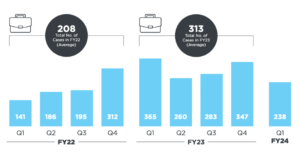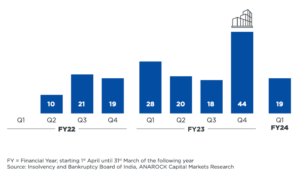Share of Real Estate in Recoveries Under IBC Rises to 18.8 Percent - Report
BusinessTeam10/18/2023
Mumbai, 18 October 2023: Real estate sector on a reported basis accounted for more than 50% of the total realizations under IBC. However subsequent to release of data by IBBI, a large key case went sub-judice following admission of an appeal before the Hon’ble NCLAT resulting in real estate sector accounting for 18.8% of total realizations under IBC. This compares very well to total realizations of 1.2% in the period between its inception in FY17 to September 2022 as indicated in an earlier report*, finds a joint report by property consultants ANAROCK and leading law firm, Khaitan & Co.

Shobhit Agarwal, MD & CEO, ANAROCK Capital says, “The total number of corporate insolvency resolution process (“CIRP”) cases filed has risen from an average of ~208 in FY22 to average of ~313 in FY23. FY24 however has commenced on a weak note with 238 cases admitted overall in the first quarter. Real estate cases have averaged about 18-20 in each quarter between October 2021 and December 2022. However, this jumped sharply in March 2023 to 44 corporate debtors being admitted into CIRP.”
No. of cases admitted into CIRP
No. of real estate cases admitted into CIRP

Sudip Mullick, Partner, Khaitan & Co, says “While CIRPs of real estate companies have increased in the last few quarters, it would be interesting to see how effectively these cases are resolved. Positive outcomes in the ongoing CIRPs of real estate companies would be the key to drive confidence of homebuyers and give a boost to the sector."
Kumar Saurabh Singh, Partner, Khaitan & Co, adds, “One of the key reasons for prolonged delay in resolution of insolvencies has been the large number of vacancies in the NCLTs. With a view to strengthen the bench, the government has recently appointed 21 members, which will take the bench strength closer to the sanctioned number of 63. This is expected to reduce the delays faced in the resolution of insolvent companies. However, it will be critical for the government to continue this momentum and ensure that vacancies are filled on time.”
Proposed Amendments to IBC
With a view to further streamline the CIR process, the Ministry of Corporate Affairs has invited comments on changes being considered to the IBC. The report covers the several key changes that are being considered. Significantly, these also include the increased use of technology in the IBC eco-system to make it more efficient and effective.
Kumar Saurabh Singh, Partner, Khaitan & Co, says, "Currently, the MCA, the Adjudicating Authority, the IBBI, information utilities and service providers operate on separate technological platforms.
“There is now a proposal to bring all of them on the same platform which will lead to enhanced transparency, minimisation of delays, and facilitate more effective decision making,” says Singh. “This calls for the development of a state-of-the-art electronic platform that can handle several processes under the Code, with minimum human interface."
The National E-Governance Services Ltd., India’s first Information Utility, has also unveiled an insolvency case management system that assist insolvency professionals in seamlessly executing all CIRP and liquidation process-related tasks in a time-bound manner.
Aashiesh Agarwaal, SVP - Research & Investment Advisory, ANAROCK Capital, says, “A Committee constituted by Ministry of Housing and Urban Affairs recommended the project-wise CIRP of real estate companies as opposed to company-wise CIRP. Further, it was recommended that necessary amendments be made to the enabling RPs to transfer the ownership and possession of sale units to the allottees while the CIR process is underway. Finally, the report recommended creation of 5 additional fast-track benches at the NCLT, to expedite the cases including real estate cases.”
The report details the proposed amendments by MCA and the recommendations by MHUA, and also examines updates on several real estate companies undergoing CIRP or having completed CIRP. These include Jaypee Infratech, Unitech, Supertech, Lavasa Corporation, Amrapali, D S Kulkarni, Three C Homes, Radius Estates, and others.